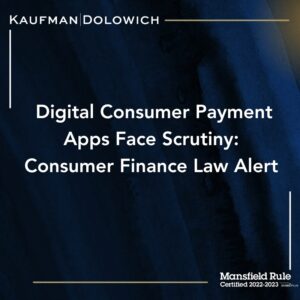Law Alert: Digital Consumer Payment Apps Face Scrutiny, by Richard Perr, Esq. and Monica Littman, Esq.
The Consumer Financial Protection Bureau (CFPB) is proposing to expand its oversight authority to larger nonbank companies that offer services like digital wallets, payment apps, funds transfer apps and person-to-person payment apps. The proposed rule, issued on November 7, would subject these larger digital consumer payment companies to the same supervisory exam process as large banks, credit unions and other financial institutions.
Specifically, the rule would “define a market for general-use digital consumer payment applications,” and would “cover providers of funds transfer and wallet functionalities through digital applications” used by consumers to make payments to other persons for personal, family, or household purposes. It would impact those entities handling more than 5 million transactions per year.
The agency estimates that the proposed threshold would bring within the CFPB’s supervisory authority approximately 17 entities, about 9 percent of all known nonbank covered persons in the market for general-use digital consumer payment applications. According to press reports, this includes the likes of Apple and Google. Being subjected to CFPB’s authority to conduct examinations will help “ensure consistent application of federal consumer financial laws across the marketplace,” according to the CFPB.
Foreshadows Greater CFPB Reach
The fact that the agency is beginning to reach down to payment portals even with its present focus on larger providers, portends to a greater reach of its supervisory authority to the broader digital payments industry in the future. Digital payments apps and wallets continue to grow in popularity yet are not subject to CFPB supervisory examinations, according to the agency. This can put consumers at risk, particularly since “funds stored on these apps may not be safe in the event of financial distress, since the funds may not be held in accounts with federal deposit insurance coverage,” according to a recent analysis by the CFPB.
Larger Participants Defined
Under proposed criteria, nonbank “covered persons are larger participants” if the entity meets each of two criteria below:
- The nonbank provider has annual covered consumer payment transaction volume of at least 5 million transactions; and,
- The nonbank provider is not a small business concern based on the applicable Small Business Administration (SBA) size standard for its primary industry.
Consumer Payment Transaction Defined
Under the proposed rule, a consumer payment transaction is defined as “the transfer of funds by or on behalf of a consumer physically located in a State to another person primarily for personal, family, or household purposes.” The term applies to transfers of consumer funds and transfers made by extending consumer credit with certain exceptions. It excludes certain transactions including international money transfers.
Interestingly enough, digital assets including crypto-assets such as Bitcoin used for the transfer of funds by or on behalf of a consumer to a third party “for person, family or household purposes” would qualify as a “consumer payment transaction.” According to the CFPB, the proposed rule would help ensure these large nonbank companies:
- Adhere to applicable funds transfer, privacy, and other consumer protection laws: The CFPB would be able to supervise larger participants for compliance with applicable federal consumer financial protection laws, which includes applicable protections against unfair, deceptive, and abusive acts and practices, rights of consumers transferring money, and privacy rights.
- Play by the same rules as banks and credit unions: The CFPB’s supervision of these large companies can foster a level playing field with depository institutions. Greater supervision of nonbanks in this market would ensure federal consumer financial protection law is enforced consistently between non-depository and depository institutions in order to promote fair competition.
The proposed rule would be the sixth in a series of CFPB rulemakings to define larger participants operating in markets for consumer financial products and services that play a substantial role in consumers’ everyday lives, according to the agency. The first five rules covered larger participants in consumer reporting, consumer debt collection, student loan servicing, international money transfers, and automobile financing.
Comments must be received on or before January 8, 2024, or 30 days after publication of the proposed rule in the Federal Register, whichever is later. You may submit comments, identified by Docket No. CFPB-2023-0053 or RIN 3170-AB17, through the federal eRulemaking Portal . It is expected there will be industry pushback, but rest assured the CFPB isn’t showing signs of backing down on efforts to expand its scrutiny on the business practices of those companies operating payment systems.
Kaufman Dolowich Can Help
The attorneys in our Consumer Financial Services team at Kaufman Dolowich are well-versed in the constantly changing regulatory landscape that defines the financial services industry. If you need assistance in complying with the ever-evolving regulatory environment we can help.











